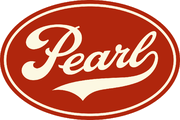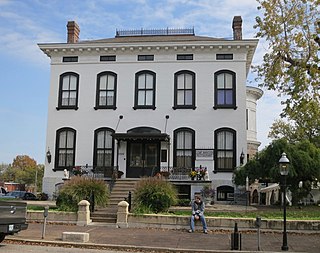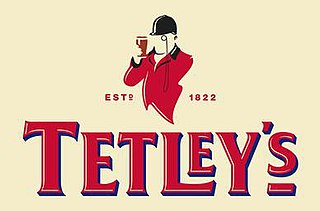
The Pabst Brewing Company is an American company that dates its origins to a brewing company founded in 1844 by Jacob Best and was, by 1889, named after Frederick Pabst. It outsources the brewing of over two dozen brands of beer and malt liquor. These include its own flagship Pabst Blue Ribbon, as well as brands from many defunct breweries.
City Brewing Company is a large brewery located in La Crosse, Wisconsin, USA. It is the former flagship facility of the Heileman Brewery, and can brew up to 7 million barrels of beer a year. Its twin-stream brewhouse can manage 16 brews of 1,100 barrels per day at the same time.

Augustiner-Bräu is a brewery in Munich, Germany, established in 1328. It is Munich's oldest independent brewery.

Northern Breweries was a Canadian brewery, with facilities in Sudbury and Sault Ste. Marie, Ontario, in operation from 1907 until 2006.

The Pearl Brewing Company was an American brewery established in 1883 in downtown San Antonio, Texas, United States. In 1985, Pearl's parent company purchased the Pabst Brewing Company and assumed the Pabst name.

The Narragansett Brewing Company is an American brewery founded in Cranston, Rhode Island in 1890. Founders included John H. Fehlberg, Augustus F. Borchandt, Herman G. Possner, George M. Gerhard, Constand A. Moeller, and Jacob Wirth.

Piels Beer, also called Piel Bros. Beer and Piel's Beer, is a regional lager beer, originally brewed in the East New York section of Brooklyn, New York City, at 315 Liberty Avenue.

Rheingold Brewery, also referred to as Rheingold Breweries, or Liebmann Breweries, was the producer and marketer of Rheingold Beer from 1883 until 1987. This article is about both the brewery and its primary brand “Rheingold,” which has been sold by other companies intermittently since Rheingold Brewery was ended.

Samuel Rubel (1881-1949) was an American millionaire immigrant from Russia.

The Lemp Mansion is a historical house in Benton Park, St. Louis, Missouri. It is also the site of three suicides by Lemp family members after the death of the son Frederick Lemp, whose William J. Lemp Brewing Co. dominated the St. Louis beer market before Prohibition with its Falstaff beer brand. The mansion is said to be haunted by members of the Lemp family.

The Lemp Brewery was a beer brewing company established in 1840 in St. Louis, Missouri that was acquired by the Griesedieck Beverage Company in 1920, which subsequently became the Falstaff Brewing Corporation. The brewery complex property consists of 27 buildings on a 13.7-acre (0.055 km2) site in the Marine Villa neighborhood. St. Louisian Steve DeBellis has been the owner of the Lemp Brewing Company trademark since 1988.

The Falstaff Brewing Corporation was an American brewery located in St. Louis, Missouri. With roots in the 1838 Lemp Brewery of St. Louis, the company was renamed after the Shakespearean character Sir John Falstaff in 1903. Production peaked in 1965 with 7,010,218 barrels brewed and then dropped 70 percent in the next 10 years. While its smaller labels linger on today, its main label Falstaff Beer went out of production in 2005. The rights to the brand are owned by Pabst Brewing Company.

Tetley's Brewery(Joshua Tetley & Son Ltd) was an English regional brewery founded in 1822 by Joshua Tetley in Hunslet, now a suburb of Leeds, West Yorkshire. The beer was originally produced at the Leeds Brewery, which was later renamed the Leeds Tetley Brewery to avoid confusion with a microbrewery of the same name.

Hull Brewery was founded in 1888 in Hull, England. It was taken over by Northern Foods in 1972 and by Mansfield Brewery in 1985.
Haffen Brewery, later J&M Haffen Brewing Company, and incorporated as Haffen Brewing Company in 1900, operated in Bronx, New York from 1856 until 1917. Owned by Matthias Haffen, (1814–1891), who came to the United States from Bavaria in 1831, it was a "landmark" on old Melrose Avenue between 151st Street and 152nd Street. The Haffen Building, a seven-story Beaux-Arts architecture style office building by architect Michael J. Garvin was built for him in 1901 to 1902. He married Catherine (Hays) Haffen (1823–1888), an emigrant from Limerick, Ireland, in 1840. They had six children.

The Duquesne Brewing Company was a major brewery in Pittsburgh, Pennsylvania, from its founding in 1899 until its dissolution in 1972. The brand was revived under the name Duquesne Brewing Company in 2008, in order to re-establish the beer in Western Pennsylvania starting in the summer of 2010.

The Jacob Schmidt Brewing Company is a former brewing company that was located at 882 W. Seventh Street in Saint Paul, Minnesota. Founded in 1855, the brewery was originally known as the Christopher Stahlmann Cave Brewery.
Peter Grant Hay was an Australian brewer, landowner, pastoralist and thoroughbred racehorse breeder. He founded the Richmond N.S. Brewing Co. Ltd in Melbourne Australia.
The 1949 New York City brewery strike was a labor strike involving approximately 7,000 brewery workers from New York City. The strike began on April 1 of that year after a labor contract between 7 local unions of the Brewery Workers Union and the Brewers Board of Trade expired without a replacement. The primary issue was over the number of workers on board delivery trucks, with the union wanting two workers per truck as opposed to the companies' standard one person per truck. Additional issues regarded higher wages and reduced working hours for the union members, among other minor issues.














